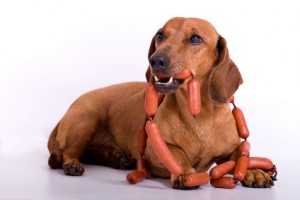Fatty foods like sausages, cheese and the cat’s biscuits, cause acute pancreatitis in overweight middle-aged dogs.
Dogs with acute pancreatitis vomit, refuse their food, withdraw from the family and show signs of pain in the belly. They hunch over, adopt a praying position, or are reluctant to move.
To treat pancreatitis we ban all food and give intravenous fluids, antibiotics, anti-inflammatory drugs and pain relief. The pancreas produces enzymes that digest food, and hormones like insulin that help the body utilise glucose. 
Under normal conditions, digestive enzymes produced by the pancreas are activated when they reach the small intestines. In pancreatitis, these enzymes are activated prematurely and digest the pancreas itself. The severity of the disease depends on the quantity of enzymes activated.
Some cases of pancreatitis are in reaction to particular medications or toxins.
Inflammation of the pancreas sometimes allows digestive enzymes to spill into the abdominal cavity resulting in damage to surrounding organs, such as the liver, bile ducts, gall bladder, and intestines. Toxins spilling into the bloodstream cause shock and problems in more distant organs.
If we suspect pancreatitis we check the level of pancreatic enzymes in the blood. Some dogs with pancreatitis have normal enzyme levels. If we still suspect pancreatitis we run a pancreatic specific lipase test.
Recovery depends on the extent of the disease and the response to initial therapy. Dogs that present with shock and depression have a very guarded prognosis. Most of the mild forms of pancreatitis respond quickly to treatment and have a good outlook.
Most dogs recover with no long-term ill-effects. However, there are three possible long-term complications of severe or repeated pancreatitis.
- If a significant number of cells that produce digestive enzymes are destroyed, proper food digestion is compromised. The dog loses weight despite a ravenous appetite and produces voluminous, soft faeces. This is known as pancreatic insufficiency and is treated with by adding the missing enzymes to the food.
- If the cells that produce insulin are destroyed diabetes mellitus can result. Signs of diabetes include weight loss despite a good appetite coupled with excessive drinking and urination. Insulin therapy may be necessary.
- In rare cases, adhesions between the abdominal organs cause momentary “catches” as your dog moves are a consequence of pancreatitis.
- After a bout of pancreatitis, dogs are prone to relapse and owners must make sure that their dog has no access to fatty foods. We recommend a low fat good quality dog food.
